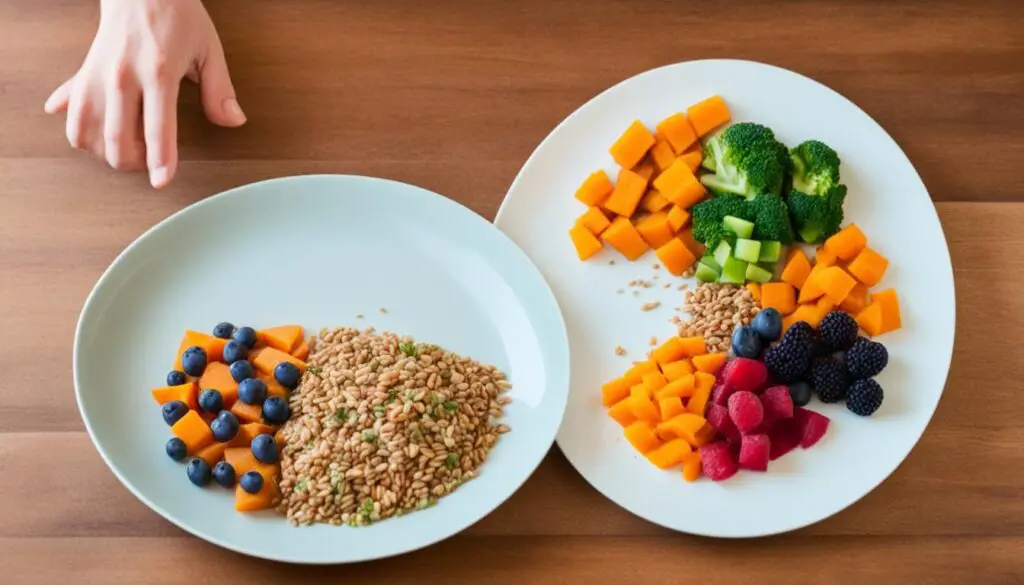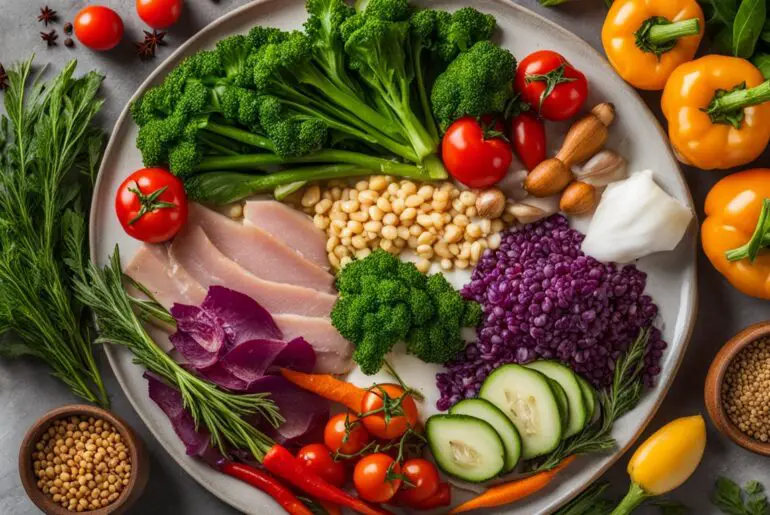Did you know that while the HCG diet can help you lose weight, many individuals struggle with maintaining their weight after completing the diet? It’s an unexpected challenge that requires a strategic approach to healthy eating and weight maintenance.
If you’ve recently finished the HCG diet and are looking for guidance on how to sustain your weight loss, you’re in the right place. In this article, I’ll provide you with essential tips to help you develop healthy eating habits and maintain your weight after the HCG diet.
Key Takeaways:
- Gradually increase your calorie intake to allow your body to adjust to the new dietary changes.
- Reintroduce sugars and starches in moderation to find a balance in your diet.
- Formulate an exercise routine to help maintain weight loss and prevent weight regain.
- Seek professional guidance from authorized HCG clinics to ensure long-term success.
- Take note of your calorie intake and weigh yourself regularly to stay on track.
Understanding the HCG Diet Process
The HCG diet is a weight loss program that combines HCG injections with calorie restriction. HCG, also known as human chorionic gonadotropin, is a hormone produced during pregnancy. It is believed to help suppress appetite and stimulate the release of stored fat, leading to weight loss.
During the HCG diet, individuals receive regular injections of HCG and follow a strict calorie-restricted diet. The purpose of the HCG injections is to target stored fat and use it as a source of energy. By reducing calorie intake, the body is forced to burn fat for fuel, resulting in weight loss.
It is important to note that the HCG diet is not a long-term solution for weight loss. It is a short-term program designed to help jumpstart weight loss and create healthy habits. It should be followed under the supervision of a healthcare professional.
While the HCG diet can be effective in shedding pounds quickly, it is essential to understand its limitations. Calorie restriction and HCG injections can lead to rapid weight loss, but it may not be sustainable in the long run. The body may enter a state of calorie deficit, which can impact metabolism and energy levels.
To maintain weight loss after completing the HCG diet, it is crucial to transition into a balanced and sustainable eating plan. This includes gradually increasing calorie intake, incorporating nutrient-dense foods, and establishing healthy eating habits.
Understanding the HCG diet process and its limitations is the first step towards successful weight maintenance. It is important to approach the diet with realistic expectations and work with healthcare professionals to develop a plan that suits your individual needs.
Gradually Increase Calorie Intake
https://www.youtube.com/watch?v=WRtJXdAvpwA
After completing the HCG diet, it is crucial to maintain a gradual approach when increasing your calorie intake. This helps prevent shock to the body and allows for a smoother transition to a regular eating pattern. Starting with a small increase and gradually reaching a general optimum calorie amount ensures that your body adjusts to the new dietary changes without rapid weight gain.
When coming off the HCG diet, it’s important to understand that your body has undergone significant calorie restriction for a period of time. Suddenly consuming a high number of calories can lead to the body storing excess energy as fat, potentially undermining your weight loss efforts. By gradually increasing your calorie intake, you allow your body to adapt and adjust accordingly.
Begin by adding small increments of calories to your daily intake, preferably in the form of nutritious, balanced meals. Increase the portions of healthy proteins, like lean chicken or fish, and include more servings of vegetables and fruits. This gradual approach not only helps prevent weight regain but also provides your body with the essential nutrients it needs for overall health and well-being.
By gradually increasing your calorie intake, you give yourself the opportunity to monitor any changes in weight and body composition. If you notice any significant changes, you can make adjustments accordingly to ensure a safe and healthy calorie consumption.
It’s important to note that the rate at which you increase your calorie intake should be personalized to your individual needs and goals. Consulting with a healthcare professional or a registered dietitian can provide you with personalized guidance and ensure that you are safely increasing your calorie intake without compromising your progress.
In summary, transitioning from the HCG diet requires a gradual increase in calorie intake to prevent rapid weight gain and help your body adjust to the new dietary changes. By starting with small increments, focusing on nutrient-dense foods, and monitoring changes in your body, you can safely and effectively maintain your weight loss.
Reintroduce Normal Diet Routine

After completing the HCG diet, it’s time to reintroduce sugars and starches into your diet. While these food groups were restricted during the diet, it is essential to bring them back in moderation to maintain your weight loss.
To reintroduce sugars and starches, start by opting for low-carb and low-fat options. This approach allows you to ease your body into processing these foods again without causing a sudden spike in calorie intake. Gradually increasing your consumption of sugars and starches allows your body to adjust to this change and prevents rapid weight regain.
It’s important to note that moderation is key when reintroducing these foods. While it may be tempting to indulge in your favorite desserts or carb-loaded meals, it’s crucial to find a balance. Monitor your weight closely during this process to ensure that you are staying on track and maintaining your desired weight.
Avoid going from one extreme to another. Instead of completely eliminating these food groups from your diet, try incorporating them into a well-balanced meal plan. For example, include whole grains, such as brown rice and quinoa, in your meals. Opt for healthier sweeteners like natural fruit sugars or stevia instead of refined sugar.
By reintroducing sugars and starches in moderation and making healthy choices, you can find a sustainable balance in your diet and maintain your weight loss after the HCG diet.
The Benefits of Reintroducing Sugars and Starches in Moderation
Reintroducing sugars and starches in moderation offers several benefits:
- Improved energy levels: Carbohydrates are the body’s primary source of energy. By reintroducing them, you ensure that your body has the fuel it needs to perform daily activities effectively.
- Mental well-being: Sugars can have a positive impact on your mood by boosting serotonin levels in the brain. Including them in your diet can help improve your overall mental well-being.
- Greater dietary flexibility: Reintroducing sugars and starches allows for a wider range of food choices, making it easier to stick to a long-term healthy eating plan.
- Sustainable weight management: By reintroducing these food groups in moderation, you can avoid feelings of deprivation and maintain a balanced diet, leading to sustainable weight management.
| Tip | Description |
|---|---|
| Eat low-carb alternatives | Replace high-carb foods with healthier options like sweet potatoes, whole grains, and legumes. |
| Monitor portion sizes | Be mindful of your portion sizes when reintroducing sugars and starches to prevent overconsumption of calories. |
| Focus on nutrient-dense foods | Incorporate foods rich in vitamins, minerals, and fiber, such as fruits, vegetables, and lean proteins, to maintain a healthy balance. |
| Practice mindful eating | Pay attention to your body’s hunger and fullness cues, and eat slowly to fully enjoy and appreciate your meals. |
| Seek support | Consider consulting a dietitian or nutritionist for personalized guidance on reintroducing sugars and starches while maintaining weight loss. |
Formulate an Exercise Routine
Exercise is a crucial aspect of maintaining weight loss after completing the HCG diet. While physical activity is limited during the diet phase, incorporating regular exercise into your routine once the diet is complete is essential for long-term success.
Cardiovascular exercises such as running, cycling, or swimming can help you burn calories, improve heart health, and boost your overall fitness. Aim for at least 150 minutes of moderate-intensity cardio exercise per week to maintain weight loss and promote overall well-being.
In addition to cardio exercises, incorporating resistance training into your exercise routine can help build lean muscle mass and increase your metabolism. This can aid in maintaining weight loss by burning more calories even at rest. Include exercises such as weightlifting, bodyweight exercises, or resistance band workouts two to three times per week.
It is important to note that the type and intensity of exercise should be tailored to your individual fitness level and preferences. Consulting with a fitness professional or personal trainer can help you develop a personalized exercise routine that aligns with your goals and abilities.
Remember to start gradually and listen to your body. If you are new to exercise or have any health concerns, it is important to consult with your healthcare provider before starting a new exercise routine.
Benefits of Regular Physical Activity:
- Helps maintain weight loss achieved after the HCG diet
- Boosts metabolism and calorie-burning
- Improves cardiovascular health
- Strengthens muscles and enhances overall fitness
- Enhances mood and reduces stress
Remember, consistency is key when it comes to exercise. Developing a regular exercise routine and sticking to it will provide the greatest benefits for weight maintenance after the HCG diet.
Motivating Quotes:
“Exercise is a celebration of what your body can do. Not a punishment for what you ate.”
– Women’s Health
“The only bad workout is the one that didn’t happen.”
– Unknown
Make exercise a priority and find activities that you enjoy. Incorporating regular physical activity into your routine will not only help you maintain your weight loss but also improve your overall health and well-being. Remember, the key is to stay active and make exercise a lifelong habit.
| Exercise Routine Tips | Benefits |
|---|---|
| Incorporate both cardio and resistance training exercises | Burns calories, improves heart health, builds lean muscle mass |
| Aim for at least 150 minutes of moderate-intensity cardio per week | Enhances overall fitness, aids in weight maintenance |
| Include two to three sessions of resistance training per week | Increases metabolism, aids in weight management |
| Consult with a fitness professional for personalized guidance | Ensures safety and effectiveness of exercise routine |
Remember to enjoy the journey and celebrate the positive changes exercise brings to your life. Stay committed to your exercise routine and continue making healthy choices to maintain your weight loss and live a vibrant, active lifestyle.
Seek Professional Guidance

After completing the HCG diet, it’s essential to have ongoing professional support to ensure long-term success in maintaining your weight loss. Seeking a medically supervised HCG program from authorized clinics is highly recommended. These clinics have the expertise and experience to provide you with personalized guidance that caters to your specific needs.
Authorized HCG clinics offer medically supervised programs that are designed to support you in your post-HCG diet journey. These programs provide a comprehensive approach to weight maintenance, offering professional guidance on nutrition, exercise, and lifestyle adjustments.
By choosing a medically supervised program, you can have peace of mind knowing that you’re receiving guidance from medical professionals who understand the intricacies of the HCG diet. They can offer insights into sustainable eating habits, help you set realistic goals, and provide support as you navigate the challenges of maintaining your weight loss.
Professional support after the HCG diet is crucial because everyone’s weight management journey is unique. The medical team at authorized HCG clinics can customize a plan that aligns with your individual needs, taking into account factors such as your metabolism, body composition, and lifestyle.
Furthermore, authorized HCG clinics can offer additional resources and services to supplement your weight maintenance efforts. These may include educational materials, recipe ideas, and access to support groups or counseling services.
Remember, maintaining weight loss requires long-term commitment and dedication. Having professional support can greatly increase your chances of success and provide you with the knowledge and tools needed to sustain your progress.
Benefits of a Medically Supervised HCG Program
Choosing a medically supervised HCG program offers several benefits:
- Personalized guidance: A medical professional will assess your unique needs and create a plan tailored to your goals and circumstances.
- Expert supervision: You’ll have access to medical experts who can monitor your progress, address any concerns, and make necessary adjustments to optimize your results.
- Safe and effective: Authorized HCG clinics ensure that you receive a safe and effective program, minimizing potential risks and maximizing the benefits of the diet.
- Accountability and motivation: Regular check-ins with your medical team can provide accountability and motivation, helping you stay on track and overcome challenges.
- Comprehensive support: Medically supervised programs offer a holistic approach, providing guidance not only on nutrition but also on exercise, lifestyle changes, and emotional well-being.
Seeking professional guidance from authorized HCG clinics can significantly enhance your post-HCG diet experience. By working with medical experts who understand the complexities of weight management, you can receive the support and guidance necessary to maintain your weight loss and achieve long-term success.
Take Note of Calorie Intake
Even after completing the HCG diet, it’s important to stay vigilant about your calorie intake. Monitoring your daily calories and regularly weighing yourself are crucial steps to staying on track and maintaining your weight loss.
Calorie monitoring allows you to keep an eye on your energy consumption and ensure that you’re not exceeding your recommended daily limits. By tracking your calorie intake, you can make necessary adjustments to your diet if needed, making it easier to maintain your achieved weight loss.
Weighing yourself regularly provides valuable feedback on your progress and alerts you to any potential weight fluctuations. By stepping on the scale consistently, you can catch any weight gain early on and take the necessary steps to address it promptly.
Remember, maintaining weight loss after the HCG diet requires a continued commitment to healthy habits. By paying attention to your calorie intake and staying aware of any changes in your weight, you can make the necessary adjustments to stay on track and achieve long-term success.
Benefits of Calorie Monitoring and Regular Weigh-Ins
1. Helps you stay accountable to your weight loss goals
2. Allows you to make informed decisions about your diet
3. Provides early detection of any potential weight regain
4. Guides you in making necessary adjustments to your calorie consumption
5. Helps you stay motivated by tracking your progress
6. Enables you to maintain and sustain your weight loss over the long term
| Weight | Date |
|---|---|
| 150 lbs | June 1st, 2022 |
| 148 lbs | June 8th, 2022 |
| 148 lbs | June 15th, 2022 |
| 146 lbs | June 22nd, 2022 |
| 145 lbs | June 29th, 2022 |
As the table above demonstrates, regular weigh-ins allow you to track your progress and keep an eye on any fluctuations. By maintaining a consistent weight over time, you can ensure that your efforts to stay on track after the HCG diet are successful.
By combining calorie monitoring with regular weigh-ins, you can stay focused on maintaining your weight loss and make any necessary adjustments to ensure long-term success. Remember to consult with a healthcare professional for personalized guidance and support.
Introduce Starch and Sugar Slowly

After completing the HCG diet, it’s important to reintroduce starch and sugar into your diet gradually. This approach allows your body to readjust and prevent potential weight gain. However, it’s crucial to focus on making healthy food choices to maintain your weight loss.
When reintroducing starch and sugar, opt for nutrient-rich options such as fruits, vegetables, whole grains, and lean proteins. These foods provide essential vitamins, minerals, and fiber while keeping you satisfied. Incorporating these choices into your meals helps ensure a well-rounded and balanced diet.
Avoid excessive calorie consumption by being mindful of portion sizes. It’s easy to overindulge when reintroducing favorite sugary treats like desserts or carb-rich dishes. Instead, practice portion control and savor these foods in moderation. This way, you can enjoy them without compromising your progress.
By gradually reintroducing starch and sugar in a balanced manner, you can maintain your weight loss without feeling deprived. Remember, the key is to make healthy food choices while avoiding excessive calorie consumption to support your long-term success.
| Food Group | Examples |
|---|---|
| Fruits | Apples, oranges, berries |
| Vegetables | Broccoli, spinach, carrots |
| Whole Grains | Quinoa, brown rice, whole wheat bread |
| Lean Protein | Chicken breast, tofu, fish |
Develop Healthy Eating Habits

Developing healthy eating habits is crucial for maintaining long-term weight loss. It involves understanding your motivations for eating, managing stress, and practicing mindful eating. By incorporating these strategies into your daily routine, you can sustain your weight loss journey and improve your overall well-being.
Understanding Eating Motivations
When it comes to healthy eating, it’s important to have a clear understanding of your motivations for eating. Some individuals may eat out of stress, boredom, or social situations. By identifying your eating triggers, you can develop strategies to manage them effectively. For example, if stress leads to emotional eating, finding alternative stress management techniques like exercise or meditation can help curb unhealthy eating habits.
Stress Management
Stress can significantly impact our eating choices and habits. Chronic stress can lead to emotional eating, cravings for comfort foods, and overeating. Implementing stress management techniques such as deep breathing exercises, journaling, or participating in activities you enjoy can help minimize stress levels and prevent mindless eating in response to stressors.
Mindful Eating
Mindful eating involves paying full attention to the present moment while consuming food. It encourages being fully aware of the flavors, textures, and sensations associated with eating. By practicing mindful eating, you can develop a healthier relationship with food, improve portion control, and make more conscious food choices. Aim to eat slowly, savor each bite, and listen to your body’s hunger and fullness cues.
“Mindful eating is about reconnecting with the pleasure of eating and allowing yourself to truly enjoy and savor every bite, without judgment or guilt.”
By developing healthy eating habits, understanding your motivations for eating, managing stress effectively, and practicing mindful eating, you can create a sustainable and balanced approach to maintaining your weight loss. Remember, it’s not just about what you eat but also how you eat that contributes to long-term success.
Now, let’s take a look at a table summarizing the key strategies for developing healthy eating habits:
| Strategies for Developing Healthy Eating Habits |
|---|
| Understand your motivations for eating |
| Manage stress effectively |
| Practice mindful eating |
Implementing these strategies into your daily routine will support your weight maintenance efforts and contribute to a healthier lifestyle overall.
Conclusion
Maintaining weight loss after the HCG diet requires dedication and a commitment to healthy habits. By gradually increasing calorie intake, reintroducing normal diet routines, incorporating exercise, seeking professional guidance, monitoring calorie intake, and developing healthy eating habits, you can achieve long-term success and sustain your weight loss.
After completing the HCG diet, it is essential to slowly increase your calorie intake to avoid shocking the body. This gradual adjustment allows your body to adapt to the new dietary changes and prevent rapid weight regain. Additionally, reintroducing sugars and starches in moderation can help you find a balance in your diet while maintaining weight loss.
Exercise is another critical aspect of maintaining weight loss after the HCG diet. Implementing a regular exercise routine, including cardiovascular and resistance training, can help you burn calories, build muscle, and prevent weight regain. Seeking professional guidance from authorized HCG clinics ensures that you receive personalized support and guidance throughout your weight maintenance journey.
Monitoring your calorie intake and weighing yourself regularly are essential strategies for staying on track after the HCG diet. By keeping track of your daily calories and making necessary adjustments to your diet, you can ensure that you maintain your weight and prevent any unwanted weight gain. Finally, developing healthy eating habits, such as practicing mindful eating and understanding your motivations for eating, can contribute to long-term success in maintaining your weight loss.
FAQ
How can I maintain my weight after completing the HCG diet?
To maintain your weight after the HCG diet, it is crucial to gradually increase your calorie intake, reintroduce normal diet routines, incorporate exercise, seek professional guidance, monitor your calorie intake, and develop healthy eating habits.
Why is it important to gradually increase calorie intake after the HCG diet?
Gradually increasing your calorie intake after the HCG diet helps prevent rapid weight gain and allows your body to adjust to the new dietary changes.
Can I reintroduce sugars and starches into my diet after completing the HCG diet?
Yes, it is advisable to reintroduce sugars and starches in moderation after completing the HCG diet. Start with low-carb and low-fat options and monitor your weight to find a balance in your diet.
Should I incorporate exercise into my routine after the HCG diet?
Yes, exercise is essential for maintaining weight loss after the HCG diet. Incorporate both cardio and resistance exercises into your routine to help maintain your weight loss and prevent weight regain.
Where can I seek professional guidance for maintaining weight loss after the HCG diet?
It is recommended to seek a medically supervised HCG program from authorized clinics. Professional support and guidance can help you navigate the post-HCG diet phase and provide tailored recommendations for your specific needs.
How can I track my calorie intake after completing the HCG diet?
To track your calorie intake, monitor your daily calories and weigh yourself regularly. This will help you ensure that you are maintaining your weight and make necessary adjustments to your diet if needed.
How should I reintroduce starch and sugar into my diet after the HCG diet?
Reintroduce starch and sugar gradually into your diet. Focus on making healthy food choices including fruits, vegetables, whole grains, and lean protein. Avoid excessive calorie consumption and be mindful of portion sizes to prevent weight gain.
How can I develop healthy eating habits after completing the HCG diet?
Developing healthy eating habits involves understanding your motivations for eating, such as stress or social situations, and finding effective ways to manage them. Practicing mindfulness and making conscious food choices can also contribute to maintaining weight loss.




